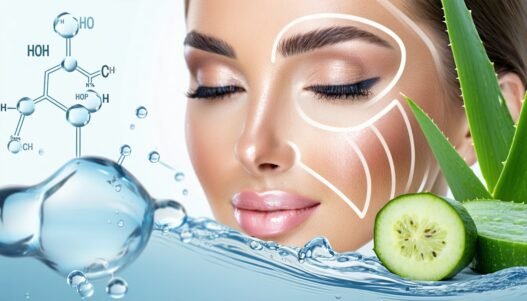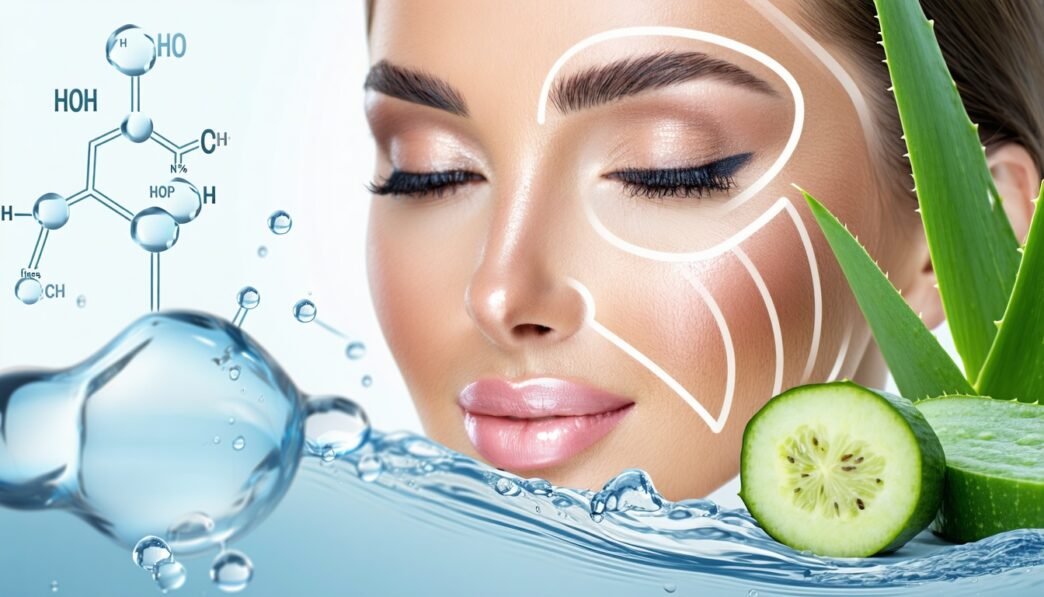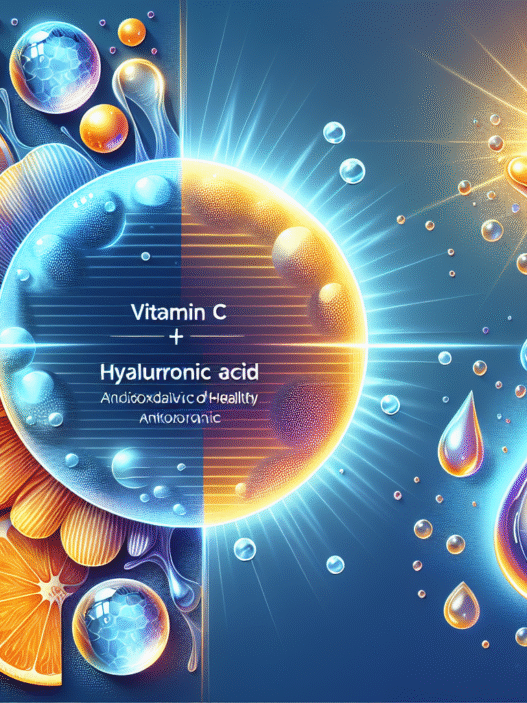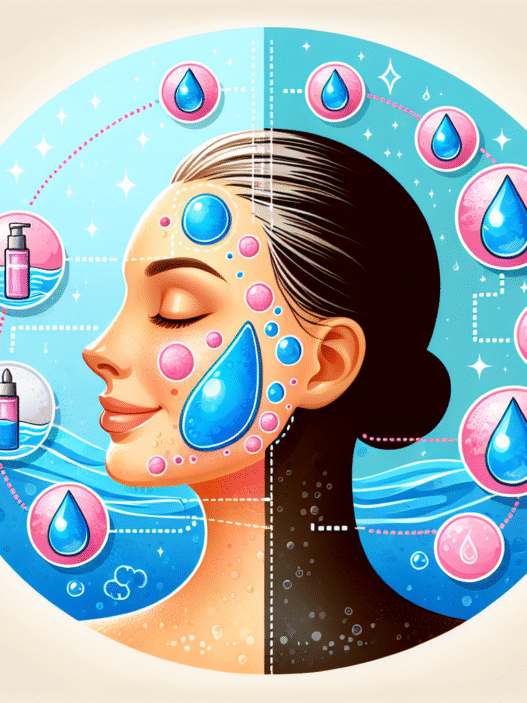Understanding Hyaluronic Acid
Hyaluronic acid (HA) has become a buzzword in the beauty and skincare industry, celebrated for its anti-aging properties and its ability to retain moisture. In this section, we explore the fundamentals of hyaluronic acid and the various roles it plays in skin health.
Hyaluronic Acid Fundamentals
Hyaluronic acid is a naturally occurring polysaccharide found throughout the body. It plays an essential role in various biological processes, such as cell differentiation, inflammation, and wound healing (PubMed Central). HA is particularly noted for its impressive ability to hold up to 1,000 times its weight in water, making it a powerful hydrating agent.
Typically, products containing hyaluronic acid are well-tolerated by all skin types. However, it is recommended to avoid concentrations above 2 percent to prevent possible irritation or dryness (Healthline).
| Property | Value |
|---|---|
| Weight of Water Held | Up to 1,000 times its weight |
| Recommended Concentration | Up to 2% |
Roles of Hyaluronic Acid
The roles of hyaluronic acid in skincare are multifaceted:
- Moisturization: By drawing moisture into the skin, HA helps to keep the skin hydrated, plump, and youthful.
- Anti-aging: As skin ages, its natural hyaluronic acid levels decrease, leading to dryness and wrinkles. Reinforcing skin with HA can mitigate these effects.
- Skin Regeneration: HA supports the skin’s natural healing processes, making it beneficial for recovery from wounds and minimizing the appearance of scars.
- Cell Function: It contributes to maintaining skin elasticity and firmness by aiding in collagen synthesis.
For skin enthusiasts wondering, does hyaluronic acid help wrinkles?, the answer lies in its moisture-retention capabilities and its potential to enhance skin texture and appearance. Understanding these fundamentals and roles is crucial for anyone looking to incorporate hyaluronic acid into their skincare regimen.
Benefits for Skin Health
Hyaluronic acid is widely recognized for its numerous benefits in promoting skin health. It is particularly noted for its exceptional hydrating properties and its potential for skin rejuvenation.
Hyaluronic Acid for Skin Hydration
One of the major advantages of hyaluronic acid is its ability to increase the moisture content in the skin. This is crucial for preventing the appearance of wrinkles and maintaining a youthful complexion. Research indicates that long-term use of hyaluronic acid, whether applied topically or taken as an oral supplement, can significantly enhance skin hydration, flexibility, and elasticity (Cleveland Clinic).
In a 2021 study involving 40 females aged 30 to 65 with signs of skin photoaging, daily application of topical hyaluronic acid resulted in notable improvements after six weeks. Participants reported enhancements in skin hydration and overall appearance.
| Measurement | Improvement After 6 Weeks |
|---|---|
| Skin Hydration | Significant |
| Skin Smoothness | Significant |
| Fine Lines and Wrinkles | Notable Reduction |
Skin Rejuvenation with Hyaluronic Acid
Hyaluronic acid plays a vital role in skin rejuvenation. The decrease in hyaluronic acid levels due to aging contributes to sagging skin and wrinkles. By restoring this essential compound, individuals can experience improved skin condition, which may include enhanced elasticity and reduced wrinkle visibility.
A study focusing on oral ingestion of hyaluronic acid found significant improvements in skin health markers over a 12-week period. Participants experienced notable changes in wrinkle assessment, transepidermal water loss, and overall skin elasticity compared to those on a placebo (PubMed Central).
| Skin Condition | Assessment After 12 Weeks |
|---|---|
| Wrinkles | Improved |
| Skin Elasticity | Enhanced |
| Water Content | Increased |
These findings highlight hyaluronic acid’s potential as an effective solution for maintaining and rejuvenating the skin, raising the question, does hyaluronic acid help wrinkles?. It is a key ingredient that beauty and skincare enthusiasts may consider integrating into their routines for anti-aging benefits.
Practical Applications
Hyaluronic acid has become a popular ingredient in beauty and skincare channels. Its applications can be seen both topically and through oral consumption, offering various benefits for skin health and appearance.
Topical Application of Hyaluronic Acid
Topical application of hyaluronic acid is widely recognized for its ability to provide skin hydration and improve overall appearance. Many skincare products, including serums and creams, incorporate this powerful ingredient. A study conducted in 2021 involving 40 females aged 30 to 65 with signs of skin photoaging showed that applying topical hyaluronic acid twice a day resulted in improved skin hydration. After six weeks, participants reported enhancements in smoothness, plumpness, and a reduction in fine lines and wrinkles (Medical News Today).
| Benefit | Reported Improvement |
|---|---|
| Hydration | Significant increase |
| Smoothness | Notable enhancement |
| Fine lines and wrinkles | Reduction observed |
The results underline how effective hyaluronic acid is in maintaining skin health and combatting signs of aging. For those interested in specific interactions with other ingredients, it is helpful to know what not to mix with hyaluronic acid.
Oral Consumption of Hyaluronic Acid
Oral consumption of hyaluronic acid is also gaining attention as a method for enhancing skin health. A 2023 study with 123 females of varying ages and skin types found that oral hyaluronic acid improved skin hydration, tone, and epidermal thickness. Additionally, taking hyaluronic acid as a supplement can improve overall skin flexibility and elasticity over time (Cleveland Clinic).
| Benefit | Result Observed |
|---|---|
| Hydration | Improvement noted |
| Skin tone | Enhanced appearance |
| Epidermal thickness | Increased measurement |
Incorporating oral hyaluronic acid supplementation into a skincare routine can be beneficial. Both oral and topical applications are considered safe for use, making them appealing choices for beauty enthusiasts. For those curious about dietary sources, you can explore what foods are high in hyaluronic acid to further support their skincare regimen.
Scientific Studies on Hyaluronic Acid
Research continues to explore the effects of hyaluronic acid on skin health, particularly regarding its ability to improve hydration and minimize the appearance of wrinkles. Here are key studies highlighting the benefits of hyaluronic acid.
Study on Skin Hydration Improvement
A 2021 study involved 40 females aged 30 to 65 who exhibited signs of skin photoaging. Participants applied a topical hyaluronic acid formulation twice daily over six weeks. Results demonstrated a significant improvement in skin hydration as well as other aspects of skin appearance.
| Parameters Impacted | Improvement Rate (%) |
|---|---|
| Hydration | 55 |
| Smoothness | + |
| Plumping | + |
| Fine Lines | + |
| Wrinkles | + |
| Overall Assessment | + |
Participants reported enhancements in smoothness, plumpness, hydration, fine lines, and wrinkles. The study concluded that a well-formulated hyaluronic acid serum results in enhanced skin hydration and visual improvements in the skin’s appearance, confirming its potential effectiveness in addressing questions like does hyaluronic acid help wrinkles?.
In addition, facial swabbing of a subset of 15 subjects indicated increased levels of topical hyaluronic acid, aligning with the observed improvements in skin appearance. Importantly, there were no significant increases in the inflammation marker IL-1a, which suggests there was no irritation caused by the product.
Study on Oral Hyaluronic Acid Benefits
Another area of focus is the benefits of oral hyaluronic acid consumption. While specific studies on oral hyaluronic acid are limited, preliminary findings suggest potential benefits for skin hydration and elasticity. Ongoing research aims to clarify the extent of these benefits and how oral supplementation might complement topical applications.
The hypothesis is that oral hyaluronic acid may reach the dermal layers, thereby influencing overall skin hydration and elasticity, which may play a role in wrinkle reduction and skin rejuvenation. Further research is essential in this field to substantiate these potential findings.
To learn more about combining hyaluronic acid with other products and maximizing its benefits, check resources like what not to mix with hyaluronic acid? and can you combine hyaluronic acid with retinol?.
The accumulation of data surrounding hyaluronic acid, both topical and oral, indicates its continual relevance in skin health discussions. As studies progress, a clearer understanding of its role in combating wrinkles and enhancing skin quality will emerge.
Usage in Cosmetic Products
Hyaluronic acid (HA) has become a key ingredient in many cosmetic products aimed at enhancing skin health, particularly in relation to hydration and reducing wrinkles. Its application in creams, serums, and other skincare formulations addresses the needs of beauty and skincare enthusiasts.
Hyaluronic Acid in Cosmetics
Hyaluronic acid is widely used in cosmetic products, particularly in formulations claiming hydration and skin elasticity effects. Cosmetics containing HA are designed to moisturize the skin, improve elasticity, and reduce the depth of wrinkles. The presence of HA forms an occlusive layer on the skin, aiding in hydration and promoting skin rejuvenation. Interest in incorporating hyaluronic acid in skincare products arose because of its decline in natural production with age (PubMed Central).
For a better understanding of how these products work, here’s a summary of key features:
| Feature | Description |
|---|---|
| Moisturization | HA helps retain moisture, making skin appear plumper. |
| Elasticity Improvement | Regular use may improve skin elasticity, reducing sagging. |
| Wrinkle Reduction | Formulations aim to minimize the appearance of fine lines and wrinkles. |
| Occlusive Layer | Creates a barrier that prevents moisture loss. |
Efficacy of Hyaluronic Acid in Skincare Products
The efficacy of hyaluronic acid in skincare products largely depends on the molecular weight of the HA used. Low molecular weight HA penetrates deeper into the skin, providing hydration at various levels, while high molecular weight HA primarily provides surface moisture and creates a protective layer. Thus, the specific formulation of HA plays a crucial role in its effectiveness.
Research indicates that when reintroduced into skincare, hyaluronic acid can effectively keep the skin hydrated, reduce the appearance of wrinkles, and smooth the skin’s texture (PubMed Central).
For those considering the latest formulations, it’s advisable to explore products that highlight these attributes, ensuring their approach aligns with the skin’s needs. For detailed insights into the effects of HA, refer to our article on what does hyaluronic acid do to your skin?.
Given the variety of hyaluronic acid cosmetic products available, users should also be aware of how to maintain optimal skin health. Information on the proper combinations and potential interactions can be found in articles such as what not to mix with hyaluronic acid? and can you combine hyaluronic acid with retinol?.
In conclusion, the incorporation of hyaluronic acid in cosmetics provides valuable benefits for skin hydration and youthfulness, making it a favored choice among beauty and skincare enthusiasts.
Safety and Recommendations
Safety of Hyaluronic Acid
Hyaluronic acid (HA) is a natural component of the skin and is generally safe for all skin types. It is less likely to cause allergic reactions. Over-the-counter products containing hyaluronic acid such as serums, creams, lotions, and eye care products have been found safe for topical application. Hyaluronic acid supplements taken orally are also considered safe. However, it is important to follow the guidelines for use, especially when it comes to prescription products, which should be administered as directed by healthcare professionals.
To prevent irritation or dryness, experts suggest avoiding products with hyaluronic acid concentrations above 2 percent (Healthline). Below is a summary of the safety aspects associated with hyaluronic acid:
| Product Type | Safety Level | Recommendations |
|---|---|---|
| Over-the-counter serums | Generally Safe | Follow usage instructions |
| Prescription products | Requires Precaution | Use as instructed by a healthcare provider |
| Oral supplements | Generally Safe | Consult with a healthcare professional |
| High concentration ( > 2% ) | Potential Irritation | Opt for lower concentrations to avoid irritation |
Recommendations for Hyaluronic Acid Use
When incorporating hyaluronic acid into a beauty routine, certain guidelines can optimize its effectiveness while ensuring safety. Here are some recommendations:
-
Choose the Right Product: Select serums and creams featuring HA as a key ingredient. Look for formulations that specify molecular weight, as this can significantly impact efficacy (PubMed Central).
-
Layering Products: HA works best when applied on damp skin, as it attracts moisture. Consider applying it immediately after cleansing. For a synergistic effect, layering it with vitamin C can enhance hydration and skin brightness (what do vitamin c and hyaluronic acid do?).
-
Avoid Mixing with Certain Ingredients: Some combinations may lead to irritation or reduced effectiveness. Avoid mixing HA with products known to cause adverse reactions, such as certain exfoliants or retinol (what not to mix with hyaluronic acid?), and ensure HA is compatible with your routine.
-
Monitor Usage: While HA is beneficial, using excessive amounts can lead to unwanted effects. Be mindful of quantity; a few drops are typically sufficient for moisturizing applications (what happens if you use too much hyaluronic acid on your face?).
-
Consult Professionals: If uncertain about incorporating hyaluronic acid, consider seeking advice from dermatologists. Many professionals endorse its use due to its moisturizing benefits and potential to reduce wrinkles.
By adhering to these safety guidelines and recommendations, beauty enthusiasts can maximize the benefits of hyaluronic acid while maintaining skin health.





















